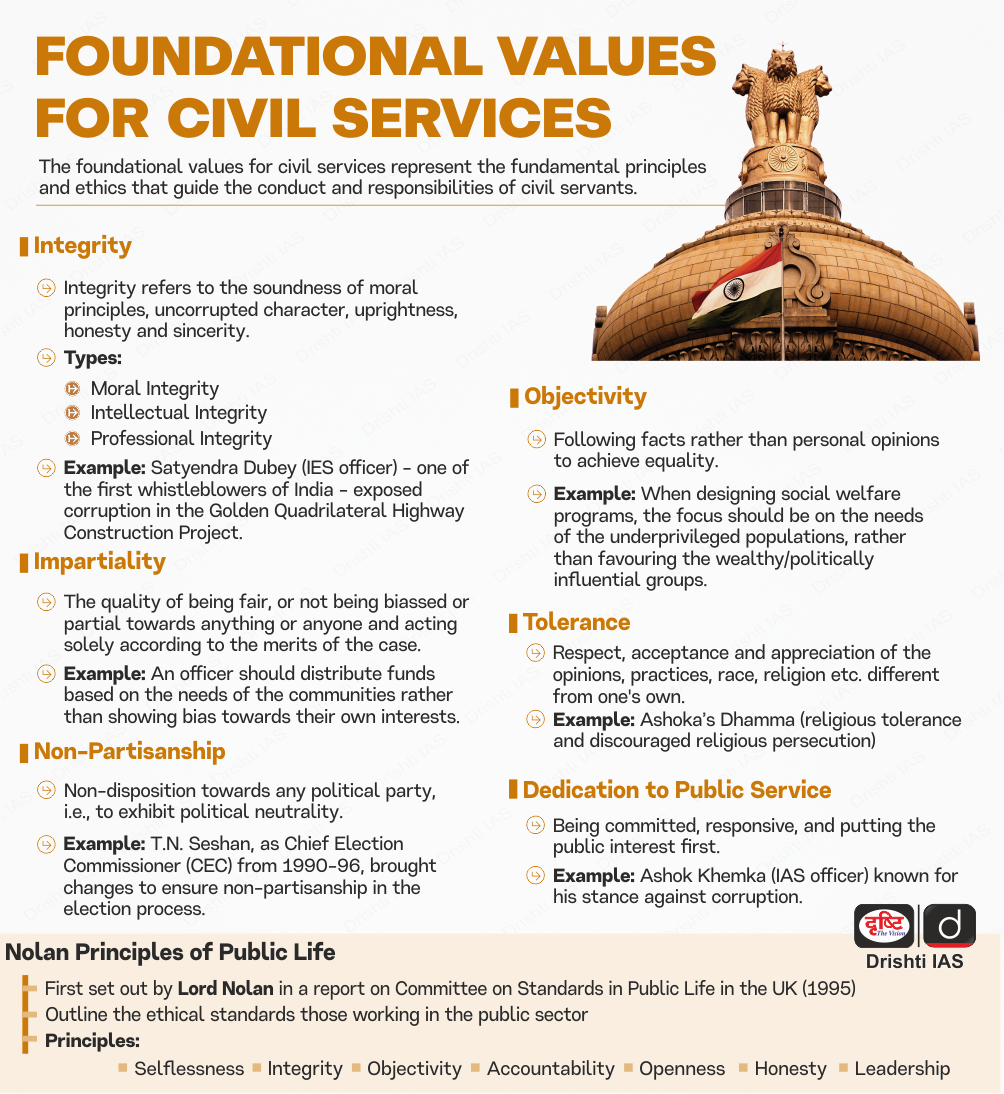Governance
Conduct Rules for Civil Servants
- 19 Nov 2024
- 8 min read
For Prelims: All-India Services (Conduct) Rules, 1968, Constitutional Values, Quasi-Judicial Power, Article 311, Delegated Legislation.
For Mains: Role of civil services in democracy, Implications of social media engagement by civil servants.
Why in News?
Recently, Kerala has suspended two IAS officers citing violation of All-India Services (Conduct) Rules, 1968 (AIS rules).
- An IAS officer made derogatory social media remarks about a senior colleague, while another was suspended for allegedly forming a religion-based WhatsApp group.
What do the All-India Services (Conduct) Rules, 1968 State?
- About: AIS rules, 1968 outline ethical and professional standards aimed at ensuring impartiality, integrity, and adherence to constitutional values in the conduct of IAS, IPS, and Indian Forest Service officers.
- Standards Outlined: The key standards outlined are summarised as follows.
- Ethical Standards: Officers must exhibit high levels of ethics, integrity, and honesty. They are also expected to remain politically neutral, accountable, and transparent in their actions and decisions.
- Supremacy of Constitutional Values: Officers must uphold constitutional values, reflecting their duty as public servants committed to the nation's legal framework.
- Engagement in Public Media: Officers may engage in public media in a bona fide professional capacity. However, they are prohibited from using such platforms to criticise government policies.
- Legal and Media Appeals: Officers are not permitted to seek redress or defend official acts subject to criticism through the court or media without prior government approval.
- General Conduct Clause: Officers must refrain from any behaviour deemed "unbecoming" of their service. This broad rule ensures that officers maintain a high standard of decorum and professionalism at all times.
What are the Issues with AIS Rules, 1968?
- Lack of Explicit Social Media Guidelines: The existing rules do not specifically address officers' communication and conduct on social media platforms.
- The growth of digital engagement has created ambiguity, making it hard to set boundaries and enforce proper behaviour.
- Unbecoming Conduct Clause: The term "unbecoming of a member of the service" remains a broad, undefined clause which leads to inconsistent enforcement and creating potential for abuse.
- Power Imbalance in Enforcement: The enforcement of these rules often rests with senior officers and government authorities. Junior officers may be vulnerable to misuse of rules by superiors, requiring protections against bias and arbitrary actions.
What is the Role of Civil Services in Democracy?
- Policy Formulation: Civil servants provide technical expertise and practical insights that help in formulation and determination of public policy.
- Implementation of Policies: Civil servants are responsible for the execution of policies passed by the legislature. This involves overseeing the practical application of laws and policies.
- Delegated Legislation: Civil servants are often tasked with framing detailed rules and regulations under delegated legislation. The legislature sets the framework, while civil servants define the specifics vital for daily government operations.
- Administrative Adjudication: Civil servants also hold quasi-judicial powers and are responsible for resolving cases that involve the rights and obligations of citizens.
- It ensures quick, fair decisions in the public interest, especially for vulnerable groups or technical issues, facilitating timely dispute resolution.
- Stability and Continuity: Civil servants maintain stability and continuity in governance during election-driven political changes, ensuring smooth policy and administrative processes despite shifts in leadership.
- Guardians of National Ideals: Civil servants act as custodians of the nation’s ideals, values, and beliefs. They play an important role in safeguarding the social, economic, and political fabric of the nation.
Article 311
- Article 311 (1): It ensures that no government employee can be dismissed, removed, or reduced in rank by an authority subordinate to the one that appointed them.
- Article 311 (2): A civil servant cannot be dismissed or removed unless an inquiry has been conducted where they are informed of the charges and given a reasonable opportunity to defend themselves.
- Exceptions to Inquiry Requirement (Article 311 (2)): An inquiry is not required in the following circumstances:
- Criminal Conviction: If the civil servant is dismissed or removed based on conduct leading to a criminal conviction (Clause 2(a)).
- Practical Impossibility: If the authority is satisfied, in writing, that holding an inquiry is not practically possible (Clause 2(b)).
- National Security: If the President or Governor determines that an inquiry is not expedient for reasons of national security (Clause 2(c)).
Way Forward
- Precise Social Media Guidelines: The rules should explicitly define the boundaries for officers' use of social media ensuring that officers can engage in public communication about government initiatives in a responsible manner.
- Clarifying the ‘Unbecoming Conduct’ Clause: The ambiguous term "unbecoming of a member of the service" can be clarified by providing an illustrative list based on past instances where actions were taken under this clause.
- Responsible Anonymity: The emphasis on remaining neutral and impartial while serving the public can be reinforced, especially in the age of social media where visibility is often prioritised over discretion.
- Judicious Use of Social Media: Officers, especially younger ones, should be reminded that while social media is a tool for promoting government initiatives, it must uphold the dignity and impartiality of the civil service.
- They should avoid personal opinions or partisan statements that could compromise their neutrality.
|
Drishti Mains Question: How do the All-India Services (Conduct) Rules, 1968 ensure that civil servants maintain ethical standards in their professional conduct? |
UPSC Civil Services Examination, Previous Year’s Question (PYQs)
Q. “Institutional quality is a crucial driver of economic performance”. In this context suggest reforms in the Civil Service for strengthening democracy. (2020)
Q. Initially Civil Services in India were designed to achieve the goals of neutrality and effectiveness, which seems to be lacking in the present context. Do you agree with the view that drastic reforms are required in Civil Services? Comment. (2017)
Q. “Traditional bureaucratic structure and culture have hampered the process of socio-economic development in India.” Comment. (2016)





